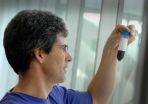(Press-News.org) Globally the sale of health care information systems is a multibillion dollar industry. The vast costs, frequent failed systems, and inability of systems to talk to each other regularly attract media comment. However policy makers still shy away from a class of software, Open Source, that could address many of these problems, because of worries about the safety and security of Open Source systems. Now new research by the University of Warwick's Institute for Digital Healthcare, and the Centre for Health Informatics and Multiprofessional Education at UCL Medical School, finds that Open Source software may actually be more secure than its often more expensive alternatives.
Dr Carl Reynolds of UCL's Centre for Health Informatics and Multiprofessional Education said:
"Software bought or otherwise distributed under a licence which require it to come bundled with the source code and the right to freely edit, reuse, and share it is called free or open source software. Such a licensing arrangement leaves the buyer in a very strong position when compared with the usual proprietary licences. The buyer is less prone to lock-in, where a buyer loses the ability to switch software products because of the use of proprietary data formats or restrictive licensing conditions. When the buyer chooses an open or free licence he or she can take the code to a rival code developer if they offer a better deal. If the code is in the public domain, and the user and programmer community are engaged, then the buyer can profit from more people inspecting and fixing the code leading to higher quality source code and in turn software."
Professor Jeremy Wyatt of the University of Warwick's Institute for Digital Healthcare said:
"Critics of Open Source often argue that, because the code is public, an attacker can more easily find and exploit vulnerabilities. But our work at the University of Warwick and UCL shows that the evidence does not bear this out and in fact Open Source Software (OSS) may be more secure than other systems.
"Proprietary systems often rely on a 'security through obscurity' argument, ie that systems that hide their inner workings from potential attackers are more secure. However security through obscurity alone completely fails when code is disclosed or otherwise discovered using tools such as debuggers or dissemblers. Worse, it has been suggested that the cloak of obscurity tends to encourage poor-quality code. Opening the source allows independent assessment of the security of a system, makes bug patching easier and more likely, and forces developers to spend more effort on the quality of their code."
The researchers also refute the argument that using Open Source Software (OSS) is inherently riskier because one automatically becomes liable for any failings of the software. They say that "typically a large organization will pay a contractor for an OSS implementation and support package. Many contractors providing OSS implementation and support offer legal indemnity to clients in exactly the same way as proprietary vendors."
###
The researchers' paper entitled "Open Source, Open Standards, and Health Care Information Systems" by: Dr Carl J Reynolds, Centre for Health Informatics and Multiprofessional Education, UCL Medical School and Professor Jeremy Wyatt of the University of Warwick's Institute for Digital Healthcare, has just been published in the Journal of Medical Internet Research at http://www.jmir.org/2011/1/e24/
Notes for Editors:
The Institute of Digital Healthcare (IDH) is an institute within the University of Warwick, and is a five-year £4 million collaboration set up in partnership with NHS West Midlands, and two University of Warwick Departments - WMG and Warwick Medical School (WMS). The IDH aims to improve people's health and wellbeing through the use of innovative digital technologies. By combining the talents and resources from WMG, WMS, NHS West Midlands, NHS Trusts, private enterprises, charities and other bodies, the IDH will design and deliver appropriate care solutions that will have a real benefit to patients and their care support networks.
The Centre for Health Informatics and Multiprofessional Education (CHIME) is a multidisciplinary centre, drawn together through a common focus on research, education, organisational change and technological innovation, linking information quality and governance for health. CHIME has expertise and undertakes research within units for clinical information management, telemedicine and decision support, clinical bioinformatics, education, training and professional development in health informatics, educational resource development and organisational development, quality and governance of health care.
For further Information please contact:
Professor Jeremy Wyatt
Institute of Digital Healthcare
International Digital Laboratory
University of Warwick
Tel: +44 (0)2476 151262
Email: Jeremy.Wyatt@warwick.ac.uk
Dr Carl J Reynolds
Centre for Health Informatics and Multiprofessional Education
UCL Medical School
Tel: +44 (0)7737904807
Email: carl.reynolds@nhs.net
Peter Dunn, Head of Communications
University of Warwick +44(0)2476 523708
mobile/cell +44(0)7767 655860 p.j.dunn@warwick.ac.uk
Research finds open-source software is actually more secure for health care IT
2011-03-09
ELSE PRESS RELEASES FROM THIS DATE:
Identifying 'anonymous' email authors
2011-03-09
Montreal, March 8, 2011 – A team of researchers from Concordia University has developed an effective new technique to determine the authorship of anonymous emails. Tests showed their method has a high level of accuracy – and unlike many other methods of ascertaining authorship, it can provide presentable evidence in courts of law. Findings on the new technique are published in the journal Digital Investigation.
"In the past few years, we've seen an alarming increase in the number of cybercrimes involving anonymous emails," says study co-author Benjamin Fung, a professor ...
Spanish tourists criticize other Mediterranean countries' lack of hospitality
2011-03-09
People visiting Spain have a high opinion of the price-quality ratio of Spanish hotels. Spanish tourists, on the contrary, complain about the quality of hotels, cleanliness and hospitality in countries such as Italy, Greece and France. This is one of the conclusions of a study carried out by the University of Cádiz (UCA) on tourism in southern Mediterranean countries.
"The five aspects most-highly rated by tourists travelling in the countries of the European Mediterranean are the leisure-spectacle activities, organised routes-excursions, cultural activities, the weather ...
Aging with grace: In-home assessments lead to better care, lower health costs
2011-03-09
INDIANAPOLIS – The March 2011 issue of the journal Heath Affairs highlights an evidence-based model of geriatric care management developed, implemented and tested by researchers and clinicians from Indiana University, the Regenstrief Institute and Wishard Health Services.
Geriatric Resources for Assessment and Care of Elders (GRACE) optimizes the health and functional status of community dwelling lower income, older adults. GRACE is now in use by Wishard Health Services, the third-largest safety-net health organization in the United States; by HealthCare Partners Medical ...
Oops -- graphene oxide's solubility disappears in the wash
2011-03-09
Graphene Oxide has had a scrum of researchers fall upon it as it retains much of the properties of the highly valued super material pure Graphene, but it is much easier, and cheaper, to make in bulk quantities; easier to process; and its significant oxygen content appears to make it soluble in water. However new research led by University of Warwick Chemist Dr Jonathan P. Rourke and Physicist University of Warwick Physicist Dr Neil Wilson, has found that that last assumption is incorrect and unfortunately Graphene oxide's solubility literally comes out in the wash.
Drs ...
The cerebellum provides clues to the nature of human intelligence
2011-03-09
Milan, Italy, 8 March 2011 – Research suggests that intelligence in humans is controlled by the part of the brain known as the 'cortex', and most theories of age-related cognitive decline focus on cortical dysfunction. However, a new study of Scottish older adults, reported in the April 2011 issue of Elsevier's Cortex (http://www.sciencedirect.com/science/journal/00109452), suggests that grey matter volume in the 'cerebellum' at the back of the brain predicts cognitive ability, and keeping those cerebellar networks active may be the key to keeping cognitive decline at ...
MU chemist discovers shortcut for processing drugs
2011-03-09
COLUMBIA, Mo. – A prolific University of Missouri chemist has discovered a quicker and easier method for pharmaceutical companies to make certain drugs.
Jerry Atwood, Curator's Professor and Chair of the Department of Chemistry in the MU College of Arts and Science, has recently published a paper – his 663rd in a refereed journal – that states that highly pressurized carbon dioxide at room temperature could replace the time consuming and expensive methods currently used to manufacture certain pharmaceutical drugs.
In the article, "A New Strategy of Transforming Pharmaceutical ...
Study shows no-till's benefits for Pacific Northwest wheat growers
2011-03-09
This release is available in Spanish.
Wheat farmers in eastern Oregon and Washington who use no-till production systems can substantially stem soil erosion and enhance efforts to protect water quality, according to research by U.S. Department of Agriculture (USDA) scientists.
Agricultural Research Service (ARS) hydrologist John Williams led a study that compared runoff, soil erosion and crop yields in a conventional, intensively tilled winter wheat-fallow system and a no-till 4-year cropping rotation system. ARS is USDA's chief intramural scientific research agency, ...
Right-handers, but not left-handers, are biased to select their dominant hand
2011-03-09
Milan, Italy, 8 March 2011 – The vast majority of humans – over 90% – prefer to use their right hand for most skilled tasks. For decades, researchers have been trying to understand why this asymmetry exists. Why, with our two cerebral hemispheres and motor cortices, are we not equally skilled with both hands? A study from the University of Aberdeen in the UK, published in the April 2011 issue of Elsevier's Cortex (http://www.sciencedirect.com/science/journal/00109452), suggests that the explanation may stem from actions that require us to use both hands at the same time, ...
Boy toddlers need extra help dealing with negative emotions
2011-03-09
URBANA – The way you react to your two-year-old's temper tantrums or clinginess may lead to anxiety, withdrawal and behavior problems down the road, and the effect is more pronounced if the child is a boy who often displays such negative emotions as anger and social fearfulness, reports a new University of Illinois study.
"Young children, especially boys, may need their parents' help working through angry or fearful emotions. If you punish toddlers for their anger and frustration or act as if their fears are silly or shameful, they may internalize those negative emotions, ...
Study analyzes role of PARP enzyme in eukaryotes
2011-03-09
An Ohio State University molecular biologist leveraged a supercomputer to help better define the family tree of a group of enzymes that have been implicated in a wide range of human diseases and are important targets for anti-cancer therapies.
Along with several OSU colleagues, Rebecca S. Lamb, Ph.D., an assistant professor of Molecular Genetics, recently analyzed the evolutionary history of the poly(ADP-ribose)polymerase (PARP) superfamily.
These proteins are found in eukaryotes, a wide range of organisms – animals, plants, molds, fungi, algae and protozoa –whose ...




